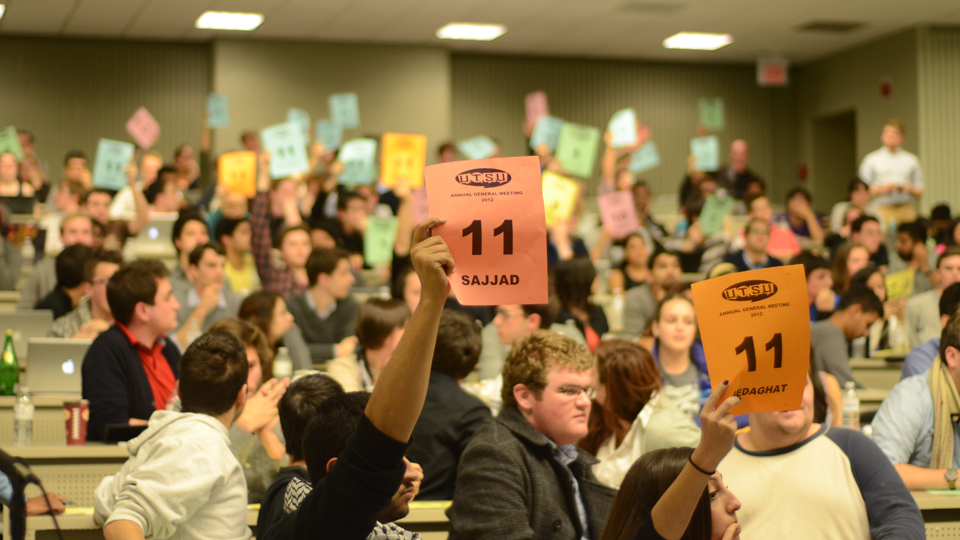The University of Toronto Students’ Union, which represents all full-time undergraduates at the St. George campus and at UTM, will hold its annual general meeting this Wednesday amid a fee diversion conflict between the union and several student societies, including Trinity College Meeting, the Engineering Society, and the Victoria University Students’ Administrative Council. Student societies have held referenda to vote on leaving UTSU, and the referenda have overwhelmingly passed, though UTSU maintains that they are not legitimate.
DEALING WITH DEFEDERATION
This past spring, the TCM, EngSoc, and VUSAC sought to defederate from UTSU and divert student fees currently being paid to UTSU to their respective student societies. Three societies that released reports on defederation alleged that they would be able to provide all the services currently provided to students by UTSU at an equal or reduced cost, since volunteers staff the majority of these societies, whereas salaried employees staff UTSU. The union contends that these reports are inaccurate.
Those societies that sought defederation requested that the students’ union host the referenda. Then-president Shaun Shepherd rejected this request, stating that UTSU’s bylaws do not allow for such referenda. However, according to an article in the Varsity on the subject, he conceded that they could be legitimized by a UTSU bylaw that states that referendum questions must be approved by three quarters of the board of directors.
The directors of TCM, VUSAC, EngSoc, and the St. Michael’s College Student Union all voted unanimously to host these referenda, since UTSU refused to host them. Shepherd and incoming UTSU president Munib Sajjad maintained that the referenda are not legitimate because they weren’t authorized by UTSU’s bylaw but, they said, they would need to be so authorized to have the power to revoke UTSU membership.
The referenda for all but SMCSU were held in late March and students voted overwhelmingly in favour of severing financial ties with UTSU.
The results were expected to go the University Affairs Board, a committee of Governing Council. The UAB, not UTSU, has the final vote on whether to approve the fee diversion. However, the referenda didn’t appear on the agenda of the UAB’s May 28 meeting, despite it having been implied that they most likely would be by the fact that vice-provost students Jill Matus requested a statement from UTSU on their stance on the referenda before the meeting. (UTSU did not make their reply public.)
Fee diversion is not in effect for the 2013/14 academic year.
STUDENT SOCIETIES SUMMIT
Since the time the referenda were held, the U of T administration has stepped in to resolve issues between the union and the student groups and to facilitate discussion on fee diversion.
On September 12, Provost Cheryl Regher released a statement outlining the details of a Student Societies Summit, which at least 23 student societies and associations were invited to attend; the groups are to discuss the referenda of fee diversion as hosted by TCM, VUSAC, and EngSoc (St. Michael’s is expected to hold their referendum next year).
Two discussion questions were posed by the administration: “How can the sometimes distinct interests of divisional societies be supported and respected in a democratic manner?” and “What are the implications of these answers on the evolution of the democratic structures of the student governments or on fee support for the activities of the divisional societies?”
FEE DIVERSION MOTIONS
There has also been a recent controversy concerning the exclusion of fee diversion motions put forward by Pierre Harfouche, one of the two engineering directors on UTSU’s board.
In October, Harfouche, then a newly elected engineering director, submitted three motions regarding fee diversion.
Harfouche’s first motion called on UTSU to support Trinity, EngSoc, and VUSAC in their stance of fee diversion at the Student Societies Summit. The second called for the appointment of new UTSU representatives to the Student Societies Summit. The third was a charter amendment to give a division within the university the authority to divert fees from UTSU.
All three motions were ruled out of order by UTSU’s Policy and Procedures Committee, although the board has the final say on whether to permit the motions on the agenda. The motions failed approval by the board the following week, meaning that the opposition-driven agenda was effectively excluded from the agenda for the upcoming AGM.
According to UTSU, the first and third motions were ruled out of order because they require that bylaw amendments be made beforehand. The board of directors must approve bylaw amendments, according to Sajjad. The second motion was rejected because it would undermine the university’s stance against the changing of Summit representatives. Harfouche has contested these determinations.
Last year’s AGM ended abruptly when members of the union refused to approve the agenda, which excluded motions submitted by Sam Greene, then co-head of Trinity College, that called for electoral reform of UTSU. The proposed reforms to the electoral policy of UTSU were submitted after the deadline, allegedly too late to be vetted by the Policy and Procedures Committee and the board of directors. According to some critics (including Greene), the deadline for these amendments was purposely obscured in order to prevent the proposed changes from appearing before the UTSU membership for discussion.
This year, UTSU members are able but not required to preregister for the upcoming AGM online. Proxy holders are not able to preregister.
The AGM will be held on Wednesday, November 27 in the OISE auditorium at the St. George campus from 6 to 9 p.m.

